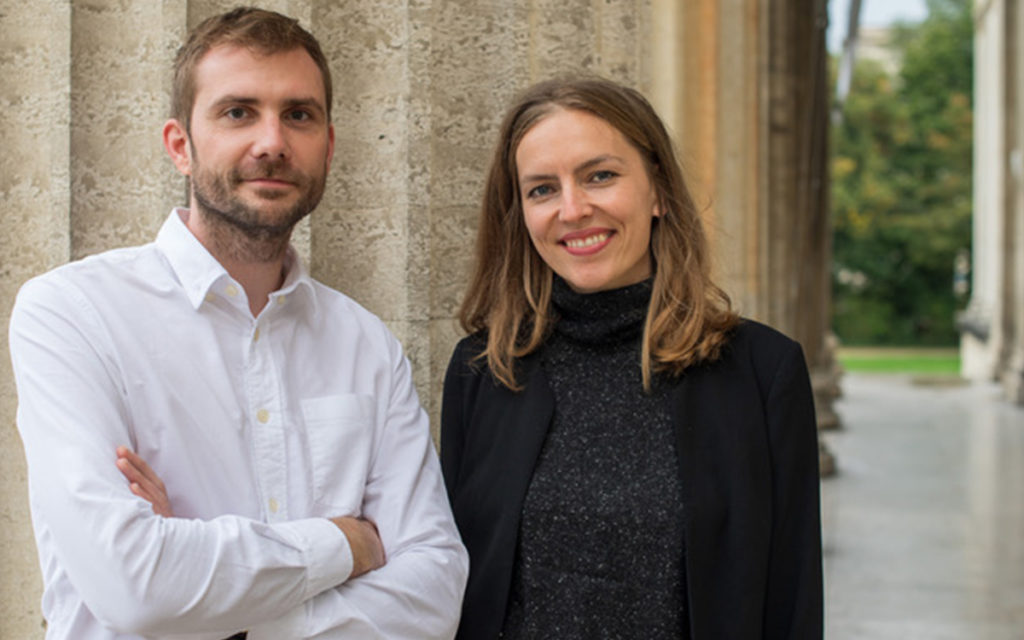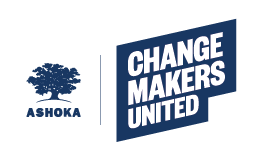News:
Talking instead of guessing

Founders Lisanne Knop and Korbinian Fischer and their team are working to prevent misunderstandings in everyday hospital life. Their Triaphon service enables patients and doctors to communicate at eye level, even if they don’t speak the same language. In the interview, Lisanne also talks about what has changed since the pandemic.
Ashoka: Lisanne, it’s not usual for doctors to set up their own business on the side. Why did you come up with the idea to start Triaphon?
Lisanne: The idea came about in my day job at a pediatric clinic. As a doctor, I repeatedly encountered patients and their parents who didn’t speak German and with whom I couldn’t communicate. That can’t be, I thought at the time. My colleague Korbinian Fischer had a similar experience. So we decided to found Triaphon – a telephone language mediation service for clinics.
For which situations in everyday practice did you develop your service?
Triaphon was developed by us primarily for the many small situations in everyday clinical practice where no on-site interpreter is available. Situations in which mistakes or misunderstandings often occur because of language barriers. It is important to us that every language is available at the push of a button, around the clock. We know the incredibly tense daily hospital routine and we know: If no one picks up the phone the first time, they won’t necessarily call again. As a doctor, you want to deal with patients at eye level – and we make this kind of communication possible. We know from the clinics we work with that there is a great need for our solution.
Can you describe how communication sometimes takes place in consulting rooms when there is no such thing as a triaphone?
It varies. In the worst case, people communicate with their hands and feet – that’s how they try to get on. Of course, this way of communicating is extremely error-prone. But there are also aids such as pictograms or relatives who translate. Sometimes it is also children. Often, however, it is about intimate information of the patients – in such cases it is problematic if relatives are used as interpreters. In recent years, there has also been an increase in violent situations in emergency rooms. According to one study, more than a third of these conflicts are due to communication problems.
You said that the idea came out of your everyday professional life. Can you tell of a situation where comprehension made a significant difference?
Once, a young child needed to be sedated so that he or she would be asleep during a painful examination. Before that, you always make sure the patient is sober by asking, because otherwise it can have serious health consequences. In this case, the nurses told me that the mother only spoke Vietnamese, but that they had been informed in advance. To be sure, I called Triaphon and it turned out that the mother had just breastfed the child. In this case, it was about a planned procedure that could easily be postponed. Had I not made that call, which ultimately took only a minute and for which they would not have ordered an on-site interpreter, the child would have been in tremendous danger.
Why did you decide to raise Triaphon as a nonprofit organization with volunteers?
We are very critical of privatization and profit optimization in healthcare. As doctors, we have experienced time and again the problematic consequences of the economization of the health care system: More and more often, medical work resembles assembly-line care. This is matched by the fact that communication is simply left out for the five percent of the population who do not speak German. People are moving away from the center of care – we want to counteract this trend.
The economization of healthcare has been a big issue ever since Covid-19 took over our daily lives. What changes have you noticed with regard to Triaphon?
In the beginning, we noticed that the number of calls continued to increase – because the interpreters on site were often unavailable. Their absence added to the already tense daily routine at the clinic.
The pandemic shows once again how important it can be to communicate quickly and clearly – and not just in hospitals …
That’s why we have temporarily extended the use of Triaphon to refugee accommodation and quarantine facilities for refugees. Because we have noticed that language misunderstandings lead to problems and resentment on both sides. And that people cannot be educated about the virus itself and the related quarantine measures. If that doesn’t work, people don’t understand what’s going on at all. When it comes to education and care in the pandemic situation, all those in Germany who do not speak German must not be forgotten.

